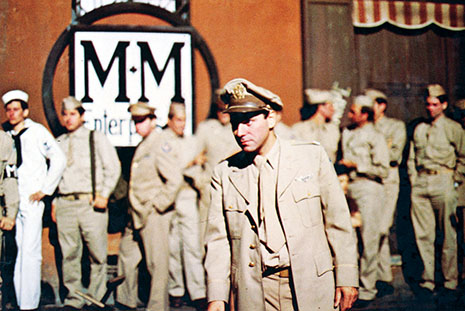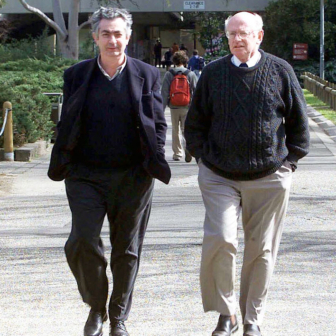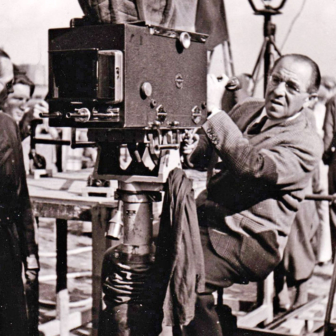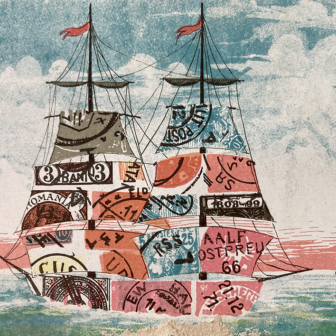IN THE Sunday Age a week or so back, someone called Sarah Wilson (pictured in precarious footwear) headed an article, “This week I break the catch-22.” Halfway into this reflection on modern mores, she wrote: “my life is a double bind. Have you read Catch-22? I haven’t. I think it was an early-’60s thing when people had time for holidays and dense reads. But I know the gist.” Also recently, in a television program which a kindly memory has otherwise erased, a character was heard to say with grave wisdom, “Oh, it’s really a catch-22,” as if he knew what he was talking about.
My point in quoting these two instances is not to show myself as au fait with popular culture but to suggest that “catch-22,” like Oliver Twist’s “Please, sir, I want some more” or Orwell’s “big brother,” has entered the language, even among those who haven’t come within a bull’s roar of reading the original. It is a term – I nearly wrote “catch-phrase” – that has made its way into the language, where it is often tossed around to indicate any tricky situation that may arise. Indeed, my computer’s Thesaurus treats it as a phrase that merits definition, though “no-win situation” and “vicious circle” hardly do justice to the insane logic of its birth pangs in the Joseph Heller novel for which it provided the title.
I’ve recently been required to return to Jane Eyre and The Catcher in the Rye twenty and fifty years, respectively, since last reading them. These two, like Heller’s now fifty-year-old Catch-22, were no doubt regarded as radical works in their time, but whereas Charlotte Brontë’s tale of a woman who refuses to be other than herself still seems groundbreaking in its insights, J.D. Salinger’s Catcher feels, in the protagonist’s keyword, “phoney,” and sentimental to boot. How, I wondered, would Catch-22 stand up to scrutiny a half-century later?
My answer is a dull one. By this I mean that Catch-22 seems to fall somewhere between Brontë and Salinger in my overall response. It hasn’t wilted into the self-conscious romanticism of Catcher but it doesn’t seem quite as monumental in its iconoclasm as Jane Eyre still does, even when the mores have shifted. But it nevertheless retains a lot of its power to shock, as in its casual disposal of small matters like human lives, and it is still often hilarious in its wild, mad logic.
Let’s be clear what “catch-22” means. “There was only one catch and that was Catch-22, which specified that a concern for one’s own safety in the face of the dangers that were real and immediate was the process of a rational mind.” As Doc Daneeka tells Yossarian, “Catch-22. Anyone who wants to get out of combat duty isn’t really crazy” and therefore won’t escape combat duty but will be sent on more missions. But “anyone who wants to go on more combat missions is crazy and is therefore likely to be grounded.” Heller doesn’t keep reiterating this but it pervades, and indeed stands for, the absurdist but alarming logic that characterises the book’s action and its dialogue.
Heller’s next novel was called Something Happened (1974) and, as I recall, we’re not sure what until the last page. What “happens” in Catch-22 is by no means a matter of linear narrative, of causally connected events intricately allied to character development. There is an almost bewilderingly large cast of characters; the action chops about in time, in ways that require more than usual alertness from the reader to keep pace; but there is also a gratifying sense of people, places, events meshing together, so that suddenly things seem to fit together, and there are a few key markers – the death of Snowden, for instance, and the bombing of Bologna – that resurface to assert their significance at various points in the madness and mayhem the book deals in.
The narrative – and what an inappropriately orderly sound the word has here – is essentially centred on the character of Yossarian, a US bombardier attached to the 256th Squadron, based on the small Mediterranean island of Pianosa, within (as it were) striking distance of Italy. The squadron is fictional; Pianosa is not, but Heller has so taken liberties with it that it becomes large enough for the squadron’s operations. This involves tents, mess halls, a hospital, and landing and launching strips for the planes undertaking the ever-increasing number (from thirty to eighty) of missions which the demented colonel keeps setting as the benchmark for repatriation.
Yossarian’s situation is influenced by his longing to get out but, as suggested above, his sanity works against this. He is simply not crazy enough to be sent home. The other great influence on his state of mind is the death of Snowden, who “had been killed over Avignon when Dobbs went crazy in mid-air and seized the controls away from Huple,” leaving Yossarian with the haunting question: “Where are the Snowdens of yesteryear?” Or, to make it easier for Captain Black, he translates: “Où sont les Neigedens d’antan?” This has always been my favourite joke in the book but on rereading I realise I should also have remembered how crucial to Yossarian had been the death of the young crew-member who dies softly whimpering, “I’m cold.” It is the ineffaceable recollection of this moment that accounts for how Yossarian emerges in flickering images as the novel’s moral centre, though that makes it all sound pompous in a way that Heller would undoubtedly repudiate. But in all the insanity of the war, a tenacious positive struggles to make itself felt in Yossarian’s constant fear of more missions and the catch-22 that seems to condemn him to them.
When I talk of him as some sort of moral centre, I refer to matters such as his attitude to “Nately’s whore,” who “held him responsible for Nately’s death and wanted to kill him.” Surrounded as he is by all manner of bizarre reasoning (to use the word loosely), his perception of “a man’s world” in which “she and everyone younger had every right to blame him” strikes an intuitively humane note. Or more explicitly when, in discussing “the big picture” and “ideals” with Major Danby, he says: “When I look up, I see people cashing in. I don’t see heaven or saints or angels. I see people cashing in on every decent impulse and every human tragedy.” But in case I make it sound as if Heller is too obviously creating in Yossarian a figure we can latch on to as a repository of the virtues – and for our sympathies – Heller also makes clear how near Yossarian comes to accepting a temptingly opportunistic offer from Colonel Korn to buy his release from more missions by agreeing to become a sort of poster boy for the squadron.
IN A WAY, it seems pointless to be trying to establish either a coherent narrative line or to talk of “characters” in any conventional sense. It is probably a better idea to relax into the book, though it will so often shock you out of such an approach, and to relish its fierce insights as they emerge – not to speak of its outrageous one-liners. Heller has all manner of serious issues on his mind but never confuses seriousness with solemnity. On the matter of wartime profiteering, surely a “serious” matter from any point of view, he executes his critique through the wonderfully lethal study of Milo Minderbinder, the mess officer, who runs a syndicate for the disposal of goods bought internationally and sold to the army. Heller gives us glimpses of Milo throughout the first half of the novel before letting us see him at full length when he embarks on the ambitious enterprise of flogging chocolate-covered cotton, having swooped down on a huge consignment of Egyptian cotton. He has an intricate system of profit-making and in the process he has become lionised in several Mediterranean countries, in which he has been variously created mayor of Palermo, assistant governor-general of Malta, vice-shah of Oran, caliph of Baghdad and the sheik of Araby. “Milo was the corn god, the rain god and the rice god in backward regions where such crude gods were still worshipped by ignorant and superstitious people, and deep inside the jungles of Africa, he intimated with becoming modesty, large graven images of his moustached face could be found overlooking primitive stone altars red with human blood.” With a character such as Milo to embody the scandal of profiteering, we don’t need a diatribe; we just need to be attuned to Heller’s blackly anarchic comedy impulses.
It’s not just this kind of opportunism, gleefully accommodated by its widespread beneficiaries within the squadron and further afield, that comes in for the novel’s remorseless satirical intentions. In our liberal-minded ways, we’ve long since accepted the war-is-hell attitudes of many a novel and film, but here the satire takes the playfully vicious line of seeing war as a game, a game played out for personal stakes, for profit, for reputation. When it looks as if there might be a hint of criticism at Milo’s bombing his own men and planes, he stills any such “protest by disclosing the huge profit the syndicate had realised on the deal with the enemy and convincing everyone that bombing his own men and planes had therefore been a commendable and very lucrative blow on the side of private enterprise.” You win some, lose some: this is the approach that anyone playing the game properly will adopt. An old man mocks Nately for “put[ting] so much stock on winning wars… The real trick lies in losing wars, in knowing which wars can be lost,” citing Italy’s record in this matter.
The comprehensive satirical broadsides take in not merely war, with men jostling for places in the upper ranks, but also the whole basis of capitalist societies, the discriminations of race and class, the roles of religion and psychiatry, and even the great American holiday, Thanksgiving. Nothing is safe. On Thanksgiving, “There were fist fights in the squadron and one stabbing... [as] the joyous celebration lasted long into the night,... with the recurring sound of retching and moaning, of laughter, greetings, threats and swearing, and of bottles shattering against rock.” There is not only hilarity but also a steely control about the verbal lashings that reminds us again and again of the quality of the mind picking its way through all this madness. Psychiatry gets it in the neck when the squadron’s shrink explains to Yossarian: “you can’t imagine how lonely it’s been for me, talking day after day to patients who haven’t the slightest knowledge of psychiatry, trying to cure people who have no real interest in me or my work.” As for religion, there is almost something touching in the chaplain’s sense that “though everyone spoke to him... no one ever said anything”; he has a disgruntled atheist for an assistant; and when the ridiculous Colonel Cathcart suggests prayers before bombing missions, but kept humorous and going easy on mention of God, the chaplain can only say sadly that most of the prayers he knows are “rather sombre in tone and make at least some passing reference to God.” As I say, nothing is safe.
It may be that the dramatis personae is so numerous that, from time to time, you lose track of who is doing what to whom. All I can say is (a) that everyone’s function will be made clear in time and (b) relax and enjoy the extraordinary range of characters you’ll meet along the way. Some are presented for raucous caricature, others can be oddly touching, as I’ve already suggested about Snowden and the chaplain. Take the pleasure Heller seems to have had in the creation of, say, the madly conflicted Colonel Cathcart, “an industrious, intense, dedicated military tactician who calculated day and night in service of himself... He was someone in the know who was always striving pathetically to find out what was going on.” Or of Doc Daneeka, whose medical practice boomed when other neighbourhood doctors joined the services at the outbreak of war and who felt aggrieved when the draft board sent someone to check that he “really did have one leg amputated at the hip and was helplessly bedridden with incurable rheumatoid arthritis” prior to shipping him to Pianosa as a flight surgeon. Much later, his wife, believing him dead, embarks on a wildly therapeutic spending spree.
The entrepreneurial Milo Minderbinder may be the best-remembered, having utterly convinced himself that he serves his country best by serving himself even better, although the name of Major Major Major Major has probably stayed in the minds of by-now elderly readers. There is a great comic set piece involving Major’s office, to which Sergeant Towser is under strict instructions to admit no one when the major is actually present. Towser, it is worth remembering, has no interest in war or advancement: “He was interested in shards and Hepplewhite furniture.” I can’t go on listing all the pleasures of character to be had from the likes of General Dreedle and his sycophantic son-in-law, Colonel Moodus, or of Captain Black’s obsession with the Glorious Loyalty Oath Crusade.
These and others are incarnated in wild strings of adjectives, mad repetitions, circularities of reasoning, and devastating one-liners that are part of Heller’s literary arsenal. Just as we are in danger of taking something at face value, he uses these weapons to pierce our fatuity. In the end, though, it is more than the sum of these endlessly entertaining parts. There is perhaps some ineradicable core of decency in Yossarian that makes us question just what the end means in the light of all that has gone before. •
Catch-22 on film
The 1970 film version of Catch-22, directed by Mike Nichols (as smart as a name could be then), has some real liveliness of invention and, in the performances of a star cast of the period, some very sharply etched characterisation, with an admirably complex Yossarian from Alan Arkin (pictured at the top of this page), an engagingly confused chaplain from Anthony Perkins, an aptly guileless Nately from Art Garfunkel and an even more aptly guileful Milo from Jon Voight. Somehow, though, despite the overall intelligence of the film, it can’t avoid a flattening out in narrative interests and some of the bizarre conversational exchanges seem less acceptable in the relentless naturalism of film. This is not a matter of believing the film to be “unfaithful” to Heller, but of not finding the film as tonally potent as the novel, of finding the physical reality of, say, the spilling of Snowden’s guts less shocking than the novel’s suggestion of this. Ultimately, diverting as a lot of it is, it misses the darkness at the novel’s core and doesn’t quite find its own.
—




